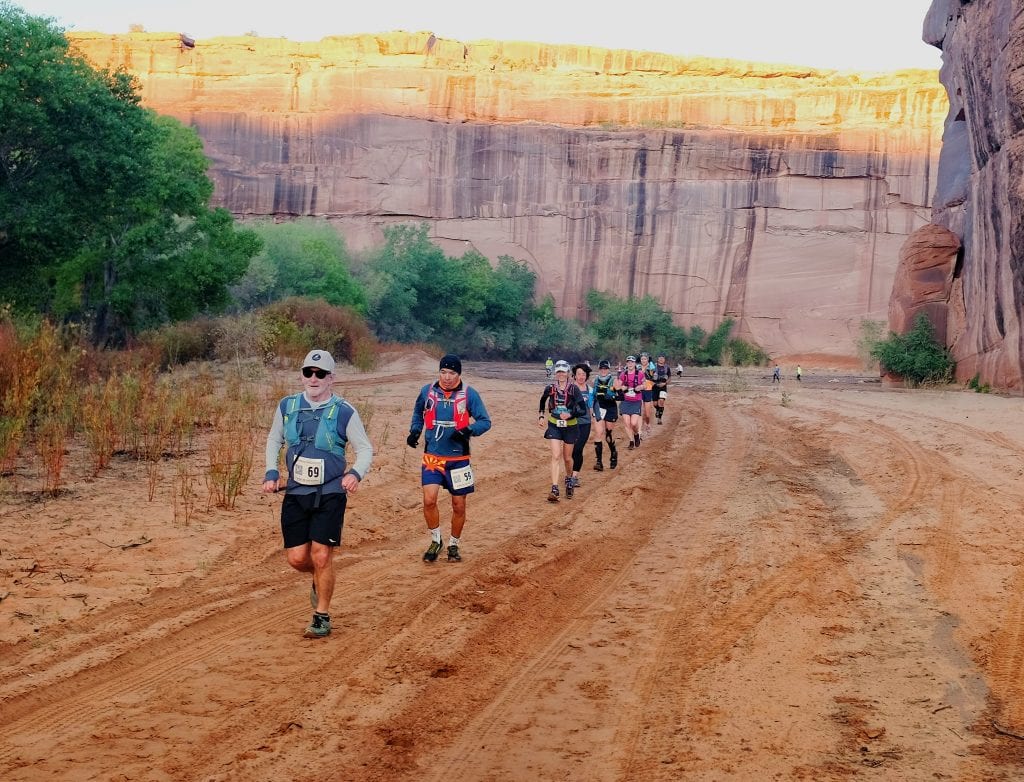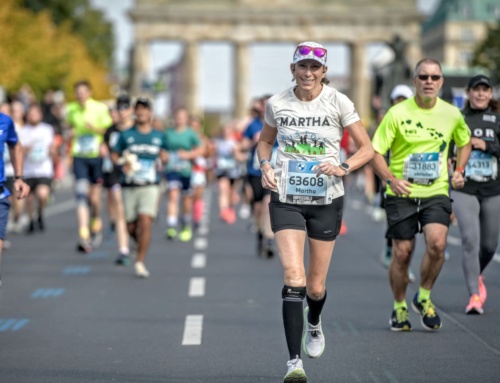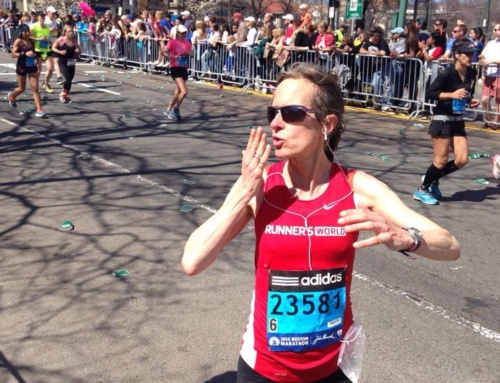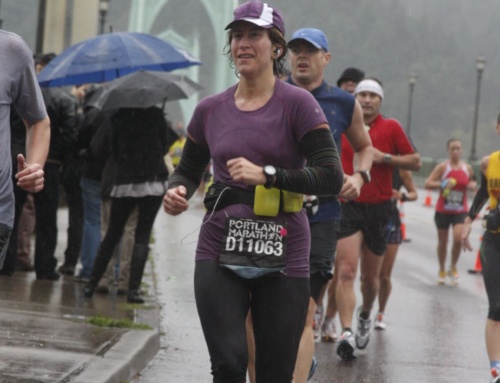Post-Run Stomach Cramps Addressed
On Saturday I ran a 20-miler; on Sunday I ate all the food.
It is a cruel irony of distance running that after a long run often you just can’t eat. Even if you’re so hungry. Even if all you’ve done in the last few miles is recounted with your dear training partner the exquisite steak tacos topped with roasted shaved onions you had two nights ago or the white pizza with basil, sweet potato, black olives and goat cheese. We were like a couple of Girl Scouts forced to hike the Appalachian Trail for “fun” (that would be my daughter; don’t tell her it isn’t “fun”).
After the run, your stomach refuses to cooperate. Nope.

Daughter Nina (sitting) on the Appalachian Trail with the Girl Scouts, July 2018, came home swearing she would never again eat oatmeal, dried fruit or beef jerky. Fun! :)
The next day? Hunger rushes in. (To misquote that legendary marathon runner Elvis Presley.)
After Fast Teacher Friend finished the stunningly spiritual Canyon de Chelly 50K in the sacred lands of northwest Arizona, she inhaled the aroma of all the lovingly home-made soups and stews laid out for participants and then turned her back on that delicious spread because her stomach hurt so bad.
Many hours later she managed two sips of beer and three bites of nachos. That was it.
Never mind not eating the food; the post-long-run stomach cramps can be gaspingly painful.
I sat in my car after a particularly long run in preparation for the JFK 50 miler with my stomach twisted into such knots I had to do some serious deep breathing before I could drive home.
AND to make matters even more fun, you don’t even have to run ultra marathons to experience the post-run stomach roller coaster. It can happen to a 5K-er who steps up to a half-marathon. Yay!
In a study reported in the British Journal of Sports Medicine, 83% of marathon runners reported GI issues during or after running at some point in their careers; women were more symptomatic than men—with 74% of them reporting “the urge to have a bowel movement.” In a review of studies of GI disorders that occur in athletes, researchers found the incidence of symptoms could affect up to 96% of subjects and that rates were highest among women.

After 8 hours of running in Arizona’s stunning Canyon de Chelly, Fast Teacher Friend could eat nothing.
SO WHAT IS GOING ON WITH POST STOMACH CRAMPS?
In semi-science speak, when you run, blood is diverted to working muscles from the stomach and GI tract. And when you stop running, blood rushes in. (Elvis Presley, MD)
To quote the researchers from U Texas and Harvard: “Exercise-related gastrointestinal symptoms are frequently associated with the consumption of a meal within two to three hours of exercising. Dehydration and analgesic use are associated with a higher incidence of GI symptoms. While some studies have found an association between the intensity of the exercise and the incidence of GI symptoms, results have been inconsistent.”
Smart Mother Runner Cherith Shaffer chimed in on AMR’S TMI Tuesday: “Your digestive tract can become ischemic [restricted in blood flow] and when blood flow rushes back in, it can be horribly painful. Then you’re dehydrated, which exacerbates it, and not to mention what you ate before or what you eat after the run can cause it to worsen.
I ended up seeing a GI doc about it and getting a colonoscopy because it was so bad for me, mostly after very hard or very long runs. Your body can adapt over time, but not always. Try tweaking hydration and food choices before and during and after the run. Cut some things out the night before and be careful what you choose to eat or drink after.”
Important caveat: You all know I’m not a doctor. Severe abdominal cramping could be a symptom of a serious underlying medical issue; if pain persists, please see a real doctor.

EAT GOOD FOOD! That’s the whole point of running, right? Right?
SO HOW DO YOU PREVENT POST-RUN STOMACH CRAMPS?
The short answer to that question is: A whole lot of practical common sense.
Eating before (or during) your run?
Keep it simple (carbohydrates) and light. AMR Liz Vollmer-Buhl notes that what you eat the night before is just as important as the morning of.
Don’t take NSAIDS
(Aspirin, Advil, Motrin) before or during your run. Runners who take ibuprofen during events double their risk of acute kidney injury, according to 2017 Stanford report.
Drink up!
Make sure you’re drinking enough during your long runs (carry it with you, run by water fountains, circle back home to refill, all of the above). Some people can tolerate conventional sports drinks; Melanie Boese upgraded to coconut water. Meghan Hoobler pre-hydrates the day before a long run/race with a side of salty pretzels.
Running more than an hour?
Take in electrolytes (via your drink like Nuun, gel or Endurolytes), including sodium. Note: Many sports drinks don’t actually have much sodium; you know you need it if your post-run gear is crusted with salt stains like the New York Thruway in early March.
And if you get the post-run cramps?
Mother Runner Elizabeth Perry solved it with pickle juice and a can of regular Coke. “I was dehydrated and the salt and sugar brought me back to life!!!! Ahhhhh.” That combo may or may not work for you, but salt and sugar are both decent options to try.
Until the cramps pass and you feel human again, treat it like you’d treat your kids’ stomach issues—the BRAT diet (bananas, rice, applesauce, tea/toast).
You may have to do some deep breathing and practice mind over cramping matter, but it’ll pass eventually.
And THEN you can enjoy all the tacos, pizza, beer, Thin Mints or whatever most pleases your post-run palate.






Oh, this article absolutely resonated with me! I have ‘stomach issues’ quite a bit, especially on longer runs. Several years ago, I stopped eating dairy entirely (I KNOW!!), and that not only cleared my skin right up (who knew??), but also made the incidences decrease, though they haven’t fully gone away. Before runs, I have to eat only a banana and almond butter. The day before a long run, I have grilled chicken and plain brown rice for dinner (sometimes, I have to skip the rice!!). I drink Nuun during all longer runs. I carry salt packets (like, from McDonald’s) with me during long runs. It’s better now than it used to be, but sometimes will still hit me like a brick.
Also, Elvis Presley MD made me laugh out loud!!
Sigh – this is me too. I get stomach cramps and nauseousness during the last miles of my long run and REALLY bad during my last marathon. Could not keep food or fluids down for hours after. I still don’t have a solution to fueling, but will keep experimenting.
I have loved Tailwind for all my marathon and ultra distance runs! I haven’t had any GI issues since switching to it after my first few miserable, crampy 26.2’s.
Salt sticks really helped my post run stomach pain/nausea!
I got nausea the last three miles of my first 50k and the whole second half of my first marathon. I figured out I wasn’t getting enough salt, I think, because I took a salt pills every hour during my 40 mile race last weekend (in addition to drinking Tailwind, which is pretty high salt) and I felt great the whole way! Hoping to keep having success with the salt pills at my next 50k in May!
This article makes me feel so much better, like I’m not crazy or some pathetic drama queen! I just finished a half marathon and spent practically the entire day moaning in the bathroom. I had waves of bloody diarrhea and terrible cramping. I just wanna run!!! I’ve tried experimenting with my pre-race food, as well as what I ingest during the run. Haven’t found any solution yet. This has been happening with each long run past about 8 miles. I’ll try the salt packets or pickle juice and see if that helps. I’m soooo done with this. My doc told me I may just need to find an alternative to running. I sure don’t want to do that….
I’ve had awful cramps after running either long (8-20 miles) distances or at a hard pace. The worse was when I BQ’ed and then had to curl up in a ball for 4-5 hours afterwards. I’ve found a heating pad helps tremendously and, this is a HUGE revelation, a lot of pronounced belly breathes as soon as I finish running and for an hour or so afterwards . I mean, make your lower belly HUGE and give the returning blood flow somewhere to go. It’s like the breaths are acting to oppose the cramps and fighting against the sense of contraction. There’s nothing worse finishing a run and then 1+ hour later feeling terrible. I’ve had GREAT success by “stretching out my cramps” before they begin; it’s akin to belly breathing during a contraction but in this application, a preemptive strike (I labored for 50 hours with my daughter at home before a emergency C-section). If I breathes deeply, the contractions were shorter and less severe if I breathes through contraction with 4-8 big belly breathes (30-45 seconds) vs letting my body contract (90-120 seconds). Anyways, this seems to be the key for heading off most of my post-run stomach troubles. Maybe it will help others :)
Thank you so much, I now have a hot water bottle belted!! around my waist and I have had 2 large glasses of pepsi cherry (yikes) and within in 20 mins i am feeling much better